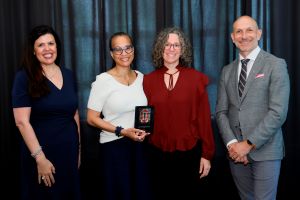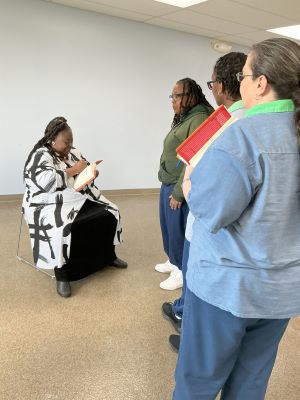About OPEEP
Ohio State’s Prison Education Exchange Project (OPEEP) is led by Dr. Mary Thomas, professor of women’s, gender and sexuality studies on the Columbus campus, and Dr. Tiyi Morris, associate professor of African American and African studies on the Newark campus. Morris and Thomas are faculty who direct the project twelve months a year. OPEEP has three primary areas of work: initiating and administering a newly accredited embedded degree program located at the Ohio Reformatory for Women (ORW), supporting combined enrollment courses that bring campus and incarcerated students together for credit-bearing classes in prison locations, and developing and offering campus initiatives that seek to inform campus communities on the impacts of mass incarceration in Ohio and the U.S. Together, they are building prison-to-college pathways through innovative teaching and collaborative learning in Ohio prison settings.
Liberation at the Margins Collective update
Liberation at the Margins (LAM) Collective is an OPEEP learning community at the Ohio Reformatory for Women (ORW) in Marysville. It is comprised of incarcerated individuals at ORW and Ohio State faculty, students and staff, who come together to study, learn and freedomdream. Collective members meet bi-weekly to read and study Black feminist and queer intellectual and political histories and Black social justice movements; develop academic skills; and present and publish collaborative pedagogical scholarship on the practice of learning at the margins. LAM has a newly launched website, lamcollective.osu.edu, which showcases members of the collective and, in the near future, will begin highlighting the research they are doing with support from a Mellon Foundation grant.
OPEEP Receives Spark Grants

This spring, in collaboration with other faculty, OPEEP was awarded two Spark Grants for Community Arts Engagement from the Office of Outreach and Engagement and the Vice Provost for the Arts. The first grant will support theater programming at Allen-Oakwood Correctional Institution (AOCI), which will be led by Margie Anich, lecturer in the Department of Theatre, Film and Media Arts at Ohio State Lima. Anich taught an improvisation class at AOCI in spring 2024, and this grant will allow her to offer a two-semester extension of theater programming at the prison. The second Spark Grant supports a collaboration with the Returning Artists Guild (RAG), Dr. Carmen Winant, professor of art (Columbus) and OPEEP Advisory Board member, and Dr. Kate Shannon, associate professor of art (Mansfield) and Ohio State’s 2025-2026 Artist Laureate. The grant will commission RAG members to create new work for exhibitions on the Mansfield and Newark campuses and to support an exhibit of Home Free: Ohio Artists Envision Prison Abolition on the Columbus campus.
OPEEP new instructor training
From May 5-7, 2025, OPEEP staff and learning community members hosted a new instructor training, which prepared 19 faculty to teach OPEEP classes inside Ohio prisons. This intensive pedagogical training included an overview of Ohio's carceral landscape, the educational opportunities available to incarcerated individuals, disability accommodations in prison classrooms, tailoring assignments, and an expert panel on classroom management and students.
While the first and third days were held on Ohio State’s main campus, the second day was spent at the Ohio Reformatory for Women (ORW) in Marysville. While there, the future instructors met with members of Liberation at the Margins (LAM) Collective, who facilitated two small group pedagogy workshops, and everyone from the degree cohort at ORW joined trainees and LAM members to enjoy a meal together in community.
With this training complete, OPEEP now has 65 faculty across four campuses and four colleges.
OPEEP recognized as a 2025 Program of Excellence
OPEEP was selected by the Office of Outreach and Engagement as one of Ohio State’s top three 2025 Programs of Excellence in Engaged Scholarship. This award recognizes programs who are making significant impacts in the community and university through their work. Co-directors Dr. Tiyi Morris and Dr. Mary Thomas accepted the award at a luncheon on April 30 at the Faculty Club in Columbus.
Special event: Loretta Ross at ORW

In March 2025, OPEEP and the Center for Feminist Research, Education and Engagement (FREE Center) hosted prominent scholar and activist Loretta Ross. Ross is one of the founding members of SisterSong and the Women of Color Reproductive Justice Collective. She also helped coin the phrase and framework “reproductive justice”.
During the first part of her visit, Ross met with Liberation at the Margins (LAM) Collective, OPEEP’s learning community at ORW, to discuss her new book Calling In: How to Start Making Change with Those You'd Rather Cancel.
LAM member Heather wrote about the impact of the visit: “(Ross) answered our questions with raw honesty and a clear message that mistakes are part of the human journey. She offered the wisdom that we will continue to make mistakes throughout our lives. Ms. Ross continually reminded us that we can choose to listen to those with whom we disagree as a practice of calling them in to a new joint understanding.”
Teaching in OPEEP: Reflections from faculty
WGSS Assistant Professor, Dr. Sierra Austin-King, began her involvement in OPEEP at the recommendation of a colleague and eventually taught her first course at ORW, Gender, Sex and Power, in spring 2024. The program’s phenomenal students and overarching mission have won Sierra over, and she looks forward to continuing her impact next academic year when she teaches History of Feminist Thought. When reflecting on her experience teaching in this unconventional classroom space, Sierra had some powerful thoughts to share on prison abolition and transformative justice.
"One thing I wish more people knew about prison abolition and transformative justice is how radically imaginative the work is! Being a part of OPEEP is one of the things I’m most proud of, and something that brings me a lot of joy! Prison abolition and transformative justice are deeply rooted in a historical and ongoing struggle for liberation, which has been shaped by centuries of oppression. Understanding prison abolition and transformative justice necessitates that we look at how systems of control have evolved over time, as well as how Black feminisms are central to envisioning alternative systems of justice.
Additionally, as someone whose extended family has been negatively impacted by the prison industrial complex, it’s rewarding to have an opportunity to give name to, and disrupt, a system that first negatively impacted me as a little girl. Having the language to unpack that childhood experience now as an educator, activist, and parent is a big part of the social justice practice I strive to espouse daily, and is ultimately a part of the legacy I want to leave behind."
Inspirational Q&A with Dr. Linda Mizejewski
When Dr. Linda Mizejewski taught with OPEEP last semester, she had an extraordinarily inspiring experience.
Q: What class did you teach with the Ohio Prison Education Exchange Project last year? What facility hosted your course?
A: I taught Feminist Perspectives on Addiction at the Ohio Reformatory for Women in Marysville. I’ve taught this class many times, bringing Ohio State students to high school classrooms and homeless shelters. This year we took the class to a population that has been very affected by addiction. The 10 students at ORW were there because of personal issues around addiction, so the course was meaningful for all of us. I was touched by the women’s willingness to share their experiences with the class.
Q: Congratulations on your recent Ronald and Deborah Ratner Distinguished Teaching Award. How did this award come in handy for you to support your OPEEP class?
A: Because I got the Ronald and Deborah Ratner Distinguished Teaching Award, I was given funding for teaching supplies. I was able to use that to get a nice projector and screens for the students in Marysville so that professors can watch films and see Power- Point slides in their classroom. I also bought Cupcake’s memoir A Piece of Cake for the entire class, as well as books about addiction for OPEEP’s library.
The students who commuted to Marysville from Ohio State’s campus are also going to be presenting on a panel at a conference hosted here at Ohio State about addiction in higher education. We are going to be sharing our experiences of teaching addiction as an interdisciplinary, feminist topic to a prison population and emphasize the importance of teaching these topics within the humanities alongside the social sciences. Our experience indicates that making addiction studies interdisciplinary, in the spirit of feminist pedagogy, is very effective.
Q: What was your favorite memory teaching your Feminist Perspectives on Addiction class with OPEEP last academic year?
A: One of the books that I taught is a memoir written by a woman named Cupcake Brown. It is a memoir about her becoming a drug addict and sex worker at the age of 11, and she had a pretty tumultuous life in LA for about 10 years. Eventually, she becomes a successful lawyer. The students loved this memoir.

When the students created their final projects and presentations, I was really surprised that one of our students, Vonda, brought a charcoal portrait depicting Cupcake Brown that the student made using a small photograph of the author on the back of her book. The student said “if you remember, Brown believes she is ugly as a young girl because she is black. This was one of the factors that contributed to her sense of low self-esteem and drug-use throughout her life; however,” Vonda said, “you can see by this portrait that she is a beautiful woman. And, that all of us are beautiful women, coming to this class, learning about addiction and sharing Cupcake’s memoir as a class experience.”
Q: Can you briefly elaborate as to how OPEEP fits into the 50 years of hard-fought feminist work at Ohio State?
A: OPEEP is very much a way of bringing our work to the community, to people within the community who cannot very easily take classes at Ohio State. Often, these students are the ones we discuss in our classrooms but who are shut out of the education process. Every feminist principle is involved in the OPEEP program, sharing our feminist expertise with a lot of marginalized populations who really appreciate what we are bringing to them.
Editor’s notes: The ORW students reported that a copy of this book had previously been available at the library there, but it was read so often that eventually the pages had fallen out. Over the holiday break, Dr. Mizejewski framed the portrait and hung it in her office so she can tell her visitors about her class at ORW, the impact of Brown’s memoir, and the story of Vonda’s artwork.
